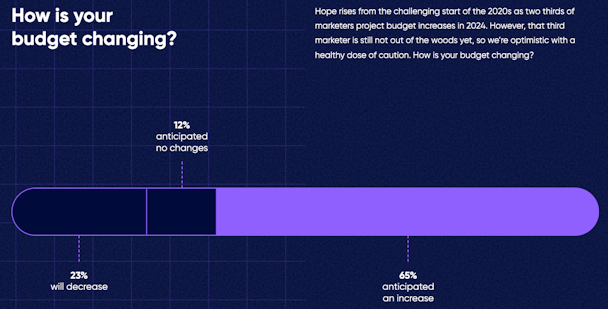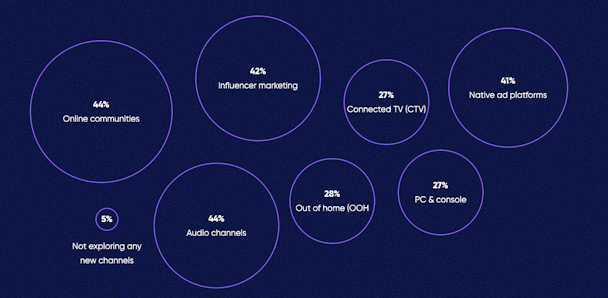We asked 1,000 app marketers about their jobs in 2024 - here's what they said
The results of a 1,000 app-marketer survey paint a pretty clear picture of the challenges, priorities and trends across the mobile and app marketing landscape, says Shani Rosenfelder (director of market insights, AppsFlyer).

The app marketing landscape is constantly evolving, with new opportunities and challenges emerging every year. App marketers know this more than most. Mobile trends have changed half a dozen times since I started writing this blog, so the need to stay on top of the trends and best practices that shape our industry and drive our growth is always there.
Delivering value for app marketers means knowing what they need. So, AppsFlyer conducted a survey of more than 1,000 app marketing professionals from around the world to get their insights and perspectives on the key topics and issues that will impact their app marketing strategy in 2024. There were as many surprises as affirmations of priors. What may seem “obvious” isn’t always so.
Budgets are on the rise, but not for everyone

One of the most positive signs from our survey is that the majority of app marketing teams (67%) expect their budgets to increase in 2024, compared to 2023. This indicates a strong recovery from the economic downturn — which took a toll mainly during the second half of 2022 and the first half of 2023 — and a renewed confidence in the app economy.
However, not all app marketers are equally optimistic. About a quarter of the respondents (24%) anticipate a lower budget in 2024, while 9% expect no change. These numbers suggest that some app categories and regions are still struggling to bounce back from the crisis, deal with constant change, and face more uncertainty and competition in the market.
Interestingly, we also found that budget expectations vary significantly by region. App marketers in the US are the most bullish, with 77% expecting a budget increase in 2024, followed by Europe (66%) and Asia-Pacific (64%). The least optimistic regions are Latin America (54%) and the Middle East and Africa (50%). These differences may reflect the different stages of economic recovery and growth potential in each region.
Measurement and AI are the top concerns for app marketers
It’s no surprise that accurate measurement in a privacy-focused world remains the biggest challenge for app marketers in 2024, as it has been for the past few years. With the introduction of ATT, SKAN, and the upcoming launch of Privacy Sandbox, app marketers have to deal with more complexity and uncertainty in tracking and attributing their app performance. The introduction of the EU’s Digital Markets Act (DMA) is the latest major privacy-protecting regulatory policy to impact anyone running campaigns in the EU.
According to the survey, 31% of app marketers rank privacy-centric measurement as their top priority for 2024, while 29% rank it as their top challenge. Whether it’s reading the tea leaves, writing on the wall, or just realizing how they can utilize this new technology, app marketers are aware of the difficulty and yet the importance of measuring their ROI in a post-IDFA and cookieless world.
However, measurement is not the only thing that app marketers are worried about.
Since ChatGPT rolled out last year, artificial intelligence (AI) has already begun to transform the ways marketers think and approach their jobs. With its rapid pace of innovation – and the FOMO that it creates – it seems that app marketers are finally ready to embrace it more fully, rather than tepidly, in 2024.
According to our survey, 27% of app marketers rank adopting AI solutions as their top priority for 2024, while 25% rank it as their top challenge. While it’s still an imperfect technology tool for marketers, clearly this industry is eager to leverage AI to optimize their app marketing campaigns, while also being aware of barriers and uncertainties in doing so.
Some of the benefits of AI for app marketing include automating workflows, personalizing and optimizing creatives, predicting user behavior, and enhancing fraud detection. However, some of the challenges of AI include finding the right solutions, integrating them with existing platforms, ensuring data quality and privacy, and interpreting the results.
But, measurement and AI are not the only things that app marketers are focused on in 2024.
App marketers are diversifying their channels and strategies

App marketers are exploring new ways to acquire and retain their users by diversifying their channels and strategies.
For user acquisition, we see that 95% of app marketers are expanding their reach beyond the traditional channels of social, search, and display, and experimenting with new platforms and formats, such as podcasts and audio channels (44%), connected TV (27%), PC & console (27%), and out of home (28%). For example, we see a surprising surge in PC & console advertising by finance app marketers, which shows that they are targeting gamers who have financial needs.
These new channels offer app marketers the opportunity to tap into new and engaged audiences, and to differentiate themselves from the competition. However, they also pose some challenges, such as measuring their effectiveness (in silo as well as their wider cross-channel marketing mix), optimizing their creatives, and ensuring their compliance with privacy regulations.
For user retention, we see that app marketers continue to primarily rely on a mix of paid and organic strategies, such as loyalty programs, owned media, and remarketing. These strategies aim to increase user loyalty, engagement, and spending, by using first-party data and personalized incentives – and are especially important in the privacy era, as third-party data becomes more scarce and unreliable.
However, they also require app marketers to invest more resources and efforts in building and maintaining their own channels and platforms, and to balance their frequency and relevance of communication with their users.
Data confidence is low among app marketers
Despite the rising budgets and the innovative strategies, there is one alarming statistic that we found from our survey: only 27% of app marketers are confident in their data and ability to prove ROI. That means that 73% of app marketers are not confident in those crucial aspects of their app marketing performance.
This is a concerning finding, as it implies that most app marketers are either flying blind or have limited visibility, without knowing what works and what doesn’t, and without being able to justify their spending and results. This could lead to wasted resources, missed opportunities, and poor decisions.
The low data confidence is a result of the measurement challenges that app marketers face in the privacy era, as well as the lack of standardization and transparency in the app marketing industry. It also reflects the need for app marketers to adopt more robust and reliable data solutions and platforms that can help them collect, analyze, and optimize their data, while respecting user privacy and complying with industry regulations.
By Shani Rosenfelder, director of market insights, AppsFlyer

